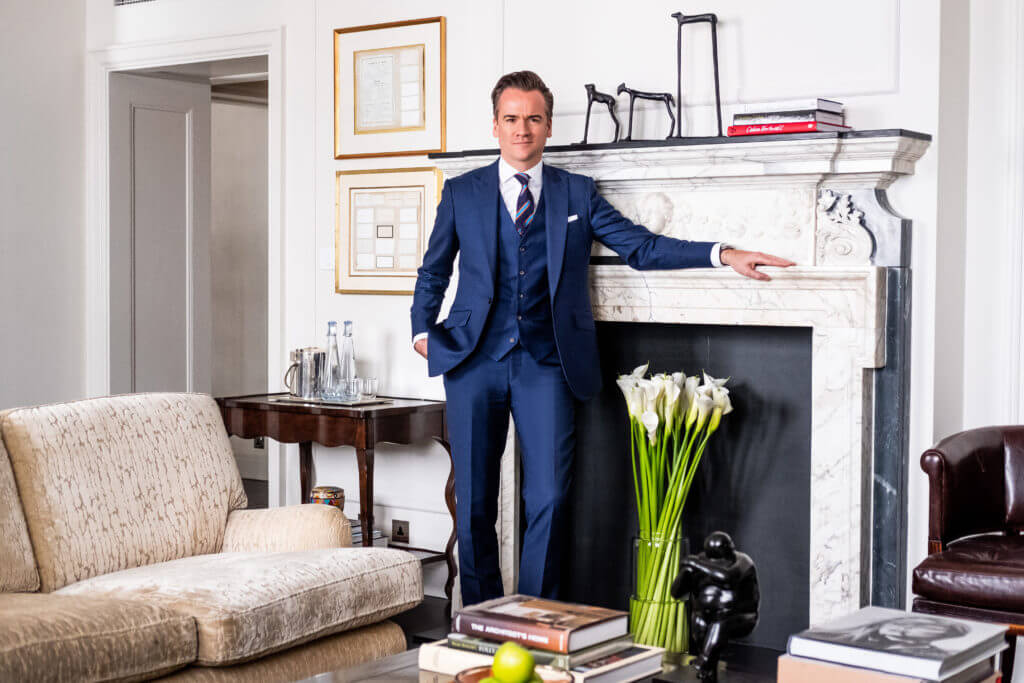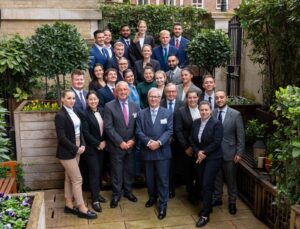As one of the youngest MD’s of a luxury London hotel, Rosewood London’s Michael Bonsor has fast become one of the most highly regarded leaders in the industry. With a fresh and modern approach to service, his hotel has a string of accolades to its name and was also home to Michael Staub, our 2018 Scholar.
We caught up with him to discuss his story, his take on service and what the future holds for the luxury hotel market.
How did you get into the industry?
I was actually born into the business after my parents became accidental hoteliers. They had bought a very large residential property in Inverness and, after realising how much it would cost to build a new roof and floors, they decided to turn it into a luxury hotel to pay for the bills. It was the first of its kind in the area so it was a really big achievement.
I was only eight at the time and we were all helping to enable it to function. I was actually making beds and cleaning toilets and really, really enjoying it. I completely fell in love with hospitality because I was meeting so many diverse people from all over the world. Inverness is relatively small and ordinary people weren’t really exposed to the diversity of guests we’d welcome to the hotel.
Where did you go after that?
I decided to join Strathclyde University (the Scottish Hotel School) to help build my skills and knowledge. It was a great experience. It helped me understand some of the theory behind the things I was doing at my parents’ hotel.
As part of my course, we’d have careers’ days with potential employers. I remember being at one and not feeling any connection with any of them so, during my lunch break, I decided to go for a walk. I ended up strolling into the Four Seasons for a mooch around. Purely by chance I bumped into their HR lady had a quick chat with her, and fast forward one month, I was working for the group in Boston the week of my 21st birthday.
That must have been quite daunting…
I didn’t even think about it. I knew I wanted to go, so I did.
I joined as a management trainee and ended up being a pot washer when I arrived. It was a real learning curve for me and it helped me to have respect for every position within a hotel or restaurant. You have to live the job from every perspective to truly understand it. I was later moved to the lounge and other positions. It was a brilliant grounding for me to learn about all the respective roles.
I spent 18 months in Boston, had a stint in Toronto, then in NYC and another stint in Toronto before heading back to NYC where I went onto open the Joël Robuchon restaurant in New York.
That was interesting as I didn’t speak French and Joël didn’t speak Scottish! It was incredibly sad to hear about his passing. He was a great man who did so much for the industry.
New York is very different to London, Boston or Toronto. How did you find it?
It’s safe to say that everything is so much more complicated in New York because it is so unionised.
What it does for you as a manager is make sure you always follow the rule book. There is no grey area. You need to be very level-headed and measured. I spent a lot of time with the workforce as you had to be with the people. You couldn’t afford not to be.
Rules were rules and they would be obeyed. It taught me a lot about true discipline. Hospitality at that level was about doing everything absolutely by the book.
I then joined Claridge’s in 2009 as food and beverage manager. I held that role for two years then became hotel manager before joining Rosewood in 2013.
You’ve moved around doing various jobs during the earlier part of your career, usually around the two-year mark. What would you advise young managers to do?
It’s important that you gather as much education and learning early on. Make sure you don’t max out in your roles; keep moving. When you are there for 18 months, you could get comfortable. That’s not a good word for a business.
We are constantly looking at how can we keep things fresh for our people so we keep them moving and developing to maintain that cutting edge.
People sometimes focus too much on the financial side of their careers rather than learning. I always say that financially it will all work out. Don’t let this drive you.
You should also get a really good overview of the whole operation as quickly as possible. You cannot be a rooms’ director if you haven’t worked in housekeeping. The key is to keep moving.
What have your experiences taught you?
I quickly realised the importance of the team. When I arrived in Boston, I saw myself as an individual and thought I was battling through my career on my own. Boston really taught me that I wasn’t. Having good mentors and people around you is so important.
You are quite bullish when you’re young, but it’s important that you appreciate those around you. Learn from everybody, be patient and stay humble.
How do you feel service is evolving with time?
Service is changing and shifting. The luxury traveller getting younger and this is having an impact on how people operate and engage with guests.
A good example is to look at how luxury brands used to launch products. They almost always insisted on having an afternoon tea of some description. Now they will want something very different. This shows attitudes are changing. We don’t always see white tablecloths in restaurants. Look at the way people are dressed too. It’s all changed.
I respect tradition-led hotels as there is a place for that type of consumer, but there is more variety and choice out there. Service needs to be right for the type of establishment and end customer or guest.
How would you define the role of service at Rosewood?
We try to encourage people to bring themselves to the workplace. That’s why we are always looking at engagement levels for our teams. We measure emotional engagement in the business before the adherence to standards.
We want to foster an environment where people feel confident and comfortable to be themselves. Of course there are expected standards that we want to be upheld, but this shouldn’t be at the expense of the character and true personality of individuals who work here.
We spend a lot of time trying to understand the drivers – and barriers – of success. A person who is truly at ease with themselves and feels good is always going to be better at their role.
It’s important to have different characters in a hotel. In fact, 98% of people in Scarfes Bar and the Holborn Dining Room haven’t worked in luxury hotels. They’ve worked in successful bars and brasseries in the City and have that flair. At the front desk, you’ll find our Lausanne hotel scholars.
It’s all about being flexible. We know that, by empowering our associates, they will be more confident with our guests.
Why are your employees called associates?
We don’t believe in hierarchies – it’s very limiting. We want people to feel part of the same journey so calling them ‘staff’ would really go against what we stand for.
It’s the little touches in any profession that can have a huge impact. This extends from how you refer to people, right the way through to what people wear.
We make sure our associates are given a wardrobe that is made to measure. In fact, we don’t like using the word ‘uniform’ – that means it’s all the same. It’s not, everything is tailored to the individuals and that needs to come across in everything we do.
Good service itself must be tailored to the specific needs of each guest, who may have 100 interactions with our associates during a two or three day stay. So, it’s important that these feel authentic and genuine. We don’t want to have a stifled, pretentious team. It doesn’t work for us.
How would you describe the UK service industry?
The UK has made great strides in hospitality as a whole over the last two decades. Service in this country is as good as it gets but, if I’m honest, there may still be a perception internally that Brits aren’t as warm as the Italians, or as polished as French front-of-house teams.
This is as much about cultural and society identity as it is service standards. The perception people have of Brits is that we are quite cold and reserved but I think this is changing. We need to ensure that, among all the broader issues that will impact our industry, we don’t lose momentum and continue to improve our standards of service.
You are very active on social media – how important do you think this vehicle is as means of helping to demonstrate the opportunities hospitality provides as a career?
Social media is now such a vital part of our business – not only to communicate to our partners such as travel agents and guests directly but of course to our future associates. Many existing associates have contacted me through Twitter, Instagram and of course LinkedIn for career advice.
People now make decisions moreso than ever before from imagery. Over 80% of millennials book travel based on that Instagrammable moment that could be at a property. I still hear other hoteliers saying this it is not important for their business however this could not be further away from the truth.
Why is the Gold Service Scholarship so important?
It’s vital that we recognise the brilliant people now. The perception of the industry will only improve with more success stories like this. The Scholarship is helping to highlight the brilliant opportunities this sector has to offer. Front-of-house is an artform and this should be celebrated.
As a country, we need to talk more about our service here. We don’t hold hospitality in high regards in lots of quarters. It’s still seen as an underpaid profession where people are overworked and this is really not the case. People can make a brilliant living and there is a wealth of benefits to working in hospitality.
People aren’t always aware of the opportunities it brings, such as the number of the positions you can hold in a hotel. We are a world within ourselves and have everything under one roof. There are unique situations where you can shift between them all.
We’ve had housekeepers who’ve become financial analysts and butlers who’ve become accountants.
Hospitality offers so many opportunities. The Gold Service Scholarship is helping to highlight these.
What impact has it had?
It’s clear that the Gold Service Scholarship has been fantastic for the profession and has already given so many people recognition.
It’s important to note that the Scholarship is also starting to make waves abroad and will travel further as it develops. Michael, for example, has taken his story with him to California. This is brilliant for the industry as a whole.
How did you feel when Michael was announced as the 2018 Gold Service Scholar?
We were absolutely delighted.
We were actually tracking Michael’s progress at every point; mentioning it at our regular gathering of associates and in all of our meetings.
It was a very proud moment for all of us when he was recognised. It showed that not only is Michael a star, but our service ethos is seen as the very best in the business.



